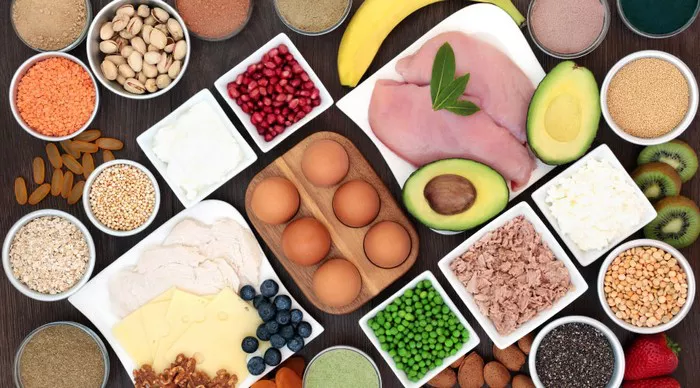Protein is an essential macronutrient that plays a critical role in supporting overall health and well-being. It serves as the building block for muscles, bones, skin, and other tissues, and is involved in numerous physiological processes within the body. Incorporating protein-rich foods into your diet is essential for meeting your nutritional needs and maintaining optimal health. In this article, we delve into the world of protein-rich foods, exploring their benefits, sources, and how to incorporate them into a balanced diet.
Understanding Protein: The Foundation of Health
Protein is composed of amino acids, which are organic compounds that serve as the building blocks of proteins. There are 20 different amino acids, nine of which are classified as essential because the body cannot produce them on its own and must obtain them from dietary sources. Protein is crucial for various bodily functions, including:
Muscle growth and repair
Enzyme production
Hormone synthesis
Immune function
Cell structure and repair
Transport of nutrients and oxygen in the blood
The Benefits of Protein-Rich Foods
Consuming an adequate amount of protein is essential for overall health and well-being. Protein-rich foods offer numerous benefits, including:
Muscle Maintenance and Growth: Protein is vital for maintaining muscle mass and promoting muscle growth, making it essential for athletes, bodybuilders, and individuals engaged in regular exercise.
Weight Management: Protein has a higher thermic effect compared to carbohydrates and fats, meaning that it requires more energy to digest and metabolize. As a result, consuming protein-rich foods can help increase feelings of fullness and satiety, leading to reduced calorie intake and potential weight loss or weight maintenance.
Blood Sugar Regulation: Protein helps stabilize blood sugar levels by slowing the absorption of glucose into the bloodstream. This can help prevent spikes and crashes in blood sugar, which is beneficial for individuals with diabetes or those at risk of developing insulin resistance.
Bone Health: Protein is a crucial component of bone tissue and plays a role in maintaining bone density and strength. Consuming protein-rich foods as part of a balanced diet can help support bone health and reduce the risk of osteoporosis and fractures.
Identifying the Best Protein-Rich Foods
Protein is found in a wide variety of foods, both from animal and plant sources. The best protein-rich foods are those that provide high-quality protein along with essential nutrients and minimal added sugars, unhealthy fats, and processed ingredients. Here are some of the best sources of protein:
Animal-Based Protein Sources
Animal-based protein sources are rich in complete proteins, meaning they contain all nine essential amino acids in sufficient quantities. They include:
Lean Meats: Chicken breast, turkey breast, lean cuts of beef and pork, and game meats such as venison and bison are excellent sources of high-quality protein.
Fish and Seafood: Fatty fish like salmon, tuna, mackerel, and sardines are not only rich in protein but also provide heart-healthy omega-3 fatty acids. Shellfish such as shrimp, crab, and lobster are also protein-rich options.
Eggs: Eggs are a versatile and affordable source of protein, with the egg white containing most of the protein and the yolk providing essential nutrients like vitamins A, D, and B12.
Dairy Products: Milk, yogurt, and cheese are rich sources of protein, calcium, and other essential nutrients. Opt for low-fat or non-fat varieties to minimize saturated fat intake.
Plant-Based Protein Sources
Plant-based protein sources offer a wealth of nutrients, fiber, and phytonutrients, making them excellent choices for vegetarians, vegans, and individuals looking to incorporate more plant-based foods into their diet. They include:
Legumes: Beans, lentils, chickpeas, and peas are rich sources of plant-based protein, fiber, and essential nutrients like iron, folate, and potassium.
Soy Products: Tofu, tempeh, edamame, and soy milk are complete sources of protein and contain all essential amino acids. They are also rich in phytoestrogens, which may have protective effects against certain chronic diseases.
Nuts and Seeds: Almonds, peanuts, walnuts, chia seeds, flaxseeds, and hemp seeds are nutritious sources of protein, healthy fats, and micronutrients like magnesium and zinc.
Whole Grains: Quinoa, amaranth, brown rice, oats, and barley are whole grains that provide protein along with fiber, vitamins, and minerals. They can be used as a base for meals or incorporated into salads, soups, and side dishes.
Incorporating Protein-Rich Foods Into Your Diet
Meeting your daily protein needs doesn’t have to be complicated. With a little planning and creativity, you can easily incorporate protein-rich foods into your meals and snacks throughout the day. Here are some tips for incorporating protein into your diet:
1. Start the day with a protein-rich breakfast by including foods like eggs, Greek yogurt, cottage cheese, or a protein smoothie made with fruits and vegetables.
2. Include a source of protein in each meal and snack to help balance blood sugar levels and promote feelings of fullness and satisfaction.
3. Experiment with different protein sources and cooking methods to keep meals interesting and flavorful. Try grilling, roasting, sautéing, or slow-cooking meats, fish, and tofu, and explore new recipes that feature plant-based proteins like beans, lentils, and quinoa.
4. Snack on protein-rich foods like nuts, seeds, yogurt, or cheese to keep hunger at bay between meals and provide sustained energy throughout the day.
5. Be mindful of portion sizes and aim to include a balance of protein, carbohydrates, and healthy fats in each meal to support overall health and well-being.
Conclusion
Protein is an essential nutrient that plays a crucial role in supporting overall health and well-being. By incorporating a variety of protein-rich foods into your diet, you can meet your nutritional needs, support muscle growth and repair, regulate blood sugar levels, and promote overall health and vitality. Whether you prefer animal-based or plant-based protein sources, there are plenty of delicious and nutritious options to choose from. So, fuel your body with the power of protein and enjoy the benefits of a balanced and healthy diet.
[inline_related_posts title=”You Might Be Interested In” title_align=”left” style=”list” number=”6″ align=”none” ids=”5698,5688,5693″ by=”categories” orderby=”rand” order=”DESC” hide_thumb=”no” thumb_right=”no” views=”no” date=”yes” grid_columns=”2″ post_type=”” tax=””]

































